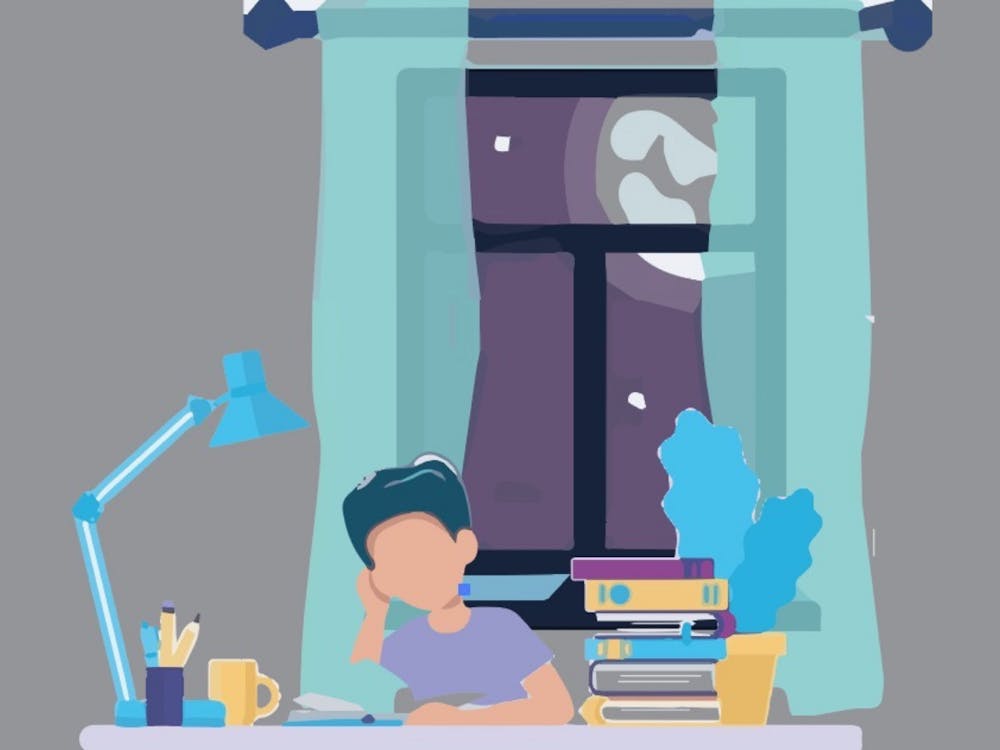Drowning in economics lectures, first-year Kathy Yu had not stepped outside all day. The lectures seemed endless, devouring hours of her time.
“Sitting and staring” summed it up well, she said.
Yu said her mental health has suffered from the lack of breaks during the condensed fall semester. Stretching from Aug. 17 to Nov. 24, this semester is nearly two weeks shorter than the last fall semester, with no breaks between the beginning of classes and the beginning of reading period.
Duke made the changes to the calendar because of the COVID-19 pandemic. The schedule aimed to “maximize our time on campus, and to minimize the disruptions and potential health hazards of travel during the semester,” President Vincent Price wrote in a May message to the community announcing preliminary plans for the fall semester.
Some students said various factors—including the unusual academic calendar and the disruption of regular social interaction—have affected their mental health this semester.
Because of the condensed schedule, Yu said she feels she has to constantly stay on top of her work. Zoom classes haven’t helped.
“It’s very easy to zone out too when there’s not much interaction and you can’t see someone in front of you,” Yu said.
First-year Cece Rodriguez said having a few days free once in a while would help her relieve some of her stress.
“When the work mounts up, you look forward to the weekend, but then you know the next week is coming and you have to get a head start on that as well,” Rodriguez said.
In contrast to Yu and Rodriguez, sophomore Jake Heller said he feels that academics have become less stressful this semester compared to previous years. Classes are easier than normal and midterm season was “way more stressful” for him last year, Heller said.
“Even when I thought the classes were hard and the material was hard, the exams ended up not being super difficult, partly because they were mostly open note and because they gave us a lot of time,” Heller said.
He said his real source of stress isn’t the condensed schedule—it’s being alone for so many hours of the day.
Although first-year Juliana Shank said she would have appreciated short breaks throughout the semester, she agreed that the lack of social interaction has generated more stress than the shortened schedule. She said she believes the current calendar was a necessity given the circumstances of the pandemic.
“As much as I feel I’m learning the content, I miss the organic interactions and I think that’s something that many students feel,” Shank said.
The transition from high school to college has added pressure, she said.
“I think the biggest thing for me is learning to deal with the stress of bigger tests in college,” Shank said. “In my high school, I think you had a lot more smaller assignments, but in college you have these big papers and these big tests.”
First-year Kai Chen said that the difficulty socializing and the transition from high school to college have affected his mental health.
“Since the semester started, my mental state has been at its all-time low,” he said.
Chen said he wishes he had closer friends so he could vent about his frustrations with them. He emphasized that the condensed format of classes and their online nature has made it difficult to socialize.
“I feel like professors gave us a lot more work than usual semesters because a lot of the in-person components are lost due to the Zoom class,” Chen said.
Get The Chronicle straight to your inbox
Sign up for our weekly newsletter. Cancel at any time.
For some classes, Chen said he has to stay up until 2 or 3 a.m. working through problem sets in order to finish his work on time. He said he believes having a break would help him recover from academic stress and process information more effectively.
The University has offered revamped mental health resources during the pandemic, as have student groups. In addition, some students have found their own ways to cope with added stress.
Rodriguez said she pushes herself to interact with others on campus. She said the existence of large student group chats has helped her stay connected and made her feel less alone. Participating in the Focus program has also helped her, she said.
“I’m living with the people I have classes with, so I know there’s someone there if I have questions,” Rodriguez said.
Yu deals with her stress differently, by trying to alter her usual routine.
“I try to switch up where I do things to add some pizzazz...I usually just switch between different courses and different things,” Yu said.
Breaks are essential, Yu said. To push herself to relax, she either plays Frisbee outside with her friends or plans her work around food breaks.
Shank said she believes that while interacting with others is important to cope, it’s also important to recognize that this semester—with its strange pandemic protocol—was never going to be perfect.
“Recognizing that we are missing out on things and that it’s valid to feel sad about that occasionally has been helpful for me,” Shank said.
If you are looking for remote or in-person mental health resources, you can find them in guides created by The Chronicle and Duke Student Government.

Ayra Charania is a Trinity junior and a senior editor of The Chronicle's 118th volume.

